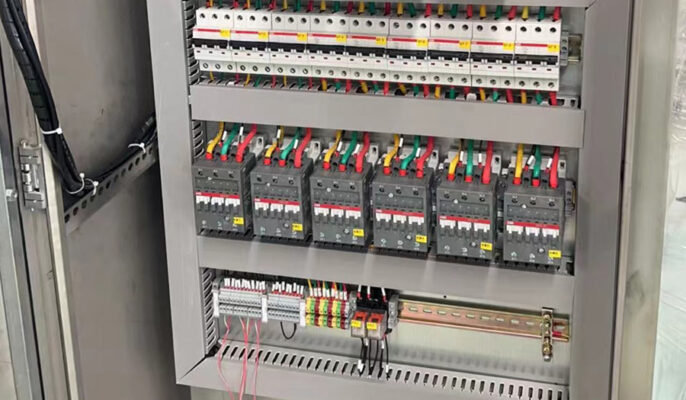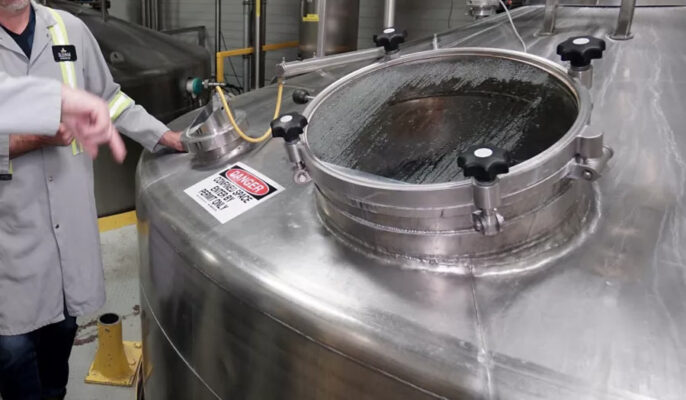Automated brewery software and solutions are designed to reduce the time you spend managing equipment and processes so that you can focus on the art of brewing beer. The control system of the brewery is a key component to ensure the stability of the production process and the consistency of product quality. These systems cover all aspects from raw material feeding to finished product packaging. Through automation and monitoring technology, precise temperature, pressure, flow, and pH control, as well as efficient operation and safety management of the production line are achieved to better brew beer.
Fermentation control system
The fermentation control system is crucial in beer production. It is responsible for managing and monitoring various parameters in the fermentation process to ensure that yeast can effectively convert sugars into alcohol and carbon dioxide while ensuring the taste, flavor, and quality of beer.
- Temperature control: The temperature during the fermentation process is an important factor affecting yeast activity and product quality. The control system monitors and adjusts the temperature of the fermentation tank or yeast pool to ensure that fermentation is carried out within the most suitable range. Temperature sensors and heating/cooling devices are usually used to achieve precise control.
- Pressure control: The carbon dioxide produced during the fermentation process will accumulate pressure in the fermentation tank. The control system needs to ensure that the pressure in the tank is within a safe range and release excess carbon dioxide through devices such as release valves to prevent excessive pressure in the tank.
- PH control: Yeast activity is highly sensitive to pH during fermentation. The control system monitors the pH of the fermentation liquid and automatically adds alkali or acid as needed to adjust it to maintain the most suitable pH range.
- Oxygen management: An adequate oxygen supply is required in the early stage of fermentation to promote yeast growth and reproduction, but oxygen entry needs to be restricted in the later stage of fermentation to avoid oxidation of chemical components in beer. The control system automatically adjusts the oxygen supply according to the fermentation stage.
- Agitation and mixing: Through the agitator or bubble device, the control system ensures that the yeast and nutrients in the fermentation liquid are evenly mixed to improve fermentation efficiency and product uniformity.
- Automatic regulation: Most fermentation control systems are automated. According to the preset program and algorithm, the system can automatically adjust the temperature, pressure, pH value, and oxygen supply, reduce human intervention, and improve production efficiency and product quality consistency.

Cleaning and disinfection control systems
Cleaning and disinfection control systems are a key part of ensuring that equipment, pipelines, and containers maintain high sanitation standards during production in breweries. These systems not only help prevent contamination and cross-infection but also ensure that the production environment meets regulatory requirements and ensures product safety and quality.
- Cleaning and disinfectant selection: The system uses specific cleaning and disinfecting chemicals that need to be able to effectively remove dirt and kill microorganisms such as bacteria and yeast. The selected cleaning and disinfecting agents must meet food safety standards and be compatible with the materials of beer production equipment.
- Automated cleaning procedures: Cleaning and disinfection control systems are usually automated, with special cleaning heads or nozzles installed on equipment and pipelines, which can automatically perform cleaning and disinfection operations according to preset programs. These programs include pre-rinse, main wash, disinfection, and post-rinse steps.
- Timing and metering control: The system sets the timing and metering of cleaning and disinfection according to the production plan and frequency of use. These operations are usually performed between production batches to ensure that the equipment is clean and sterile before the next use.
- Monitoring and verification: During the cleaning and disinfection process, the system will monitor key parameters in real-time through sensors and monitoring devices, such as cleaning solution concentration, temperature, and flow rate. In addition, verification procedures will be carried out to ensure that cleaning and disinfection achieve the expected hygienic effect.
Bottling and packaging system
The bottling and packaging control system is a key component in ensuring the quality and hygiene standards of the final product during the beer production process.
- Bottling line/canning line equipment: The bottling and packaging control system includes various equipment on the bottling or canning line, such as conveyor belts, washing machines, filling machines, sealing machines, labeling machines, and packaging machines. These equipment are usually managed and regulated by an automated control system.
- Cleaning and disinfection: Before bottling or canning, the bottles or cans need to go through a cleaning and disinfection process to ensure sterility and cleanliness. The control system automatically adjusts the concentration and use of cleaning agents and disinfectants to ensure the hygiene standards of each container.
- Filling and sealing control: The core link of the bottling or canning line is filling and sealing. The control system monitors the filling volume of beer to ensure that each bottle or can of beer reaches the standard filling volume. The sealing machine ensures the safety and sealing of the seal.
- Packaging material management: The system manages and monitors the materials used to package beer, such as bottle caps, labels, packaging boxes, etc. Ensure that they meet the specifications and hygiene requirements of the product and can be effectively applied to the product.
Brewing and ingredient control system
- Ingredient management: The system manages and monitors the input amount and proportion of malt, hops, water, and other possible additives. The accuracy and stability of these ingredients are critical to the quality of the final beer.
- Malt grinding and steeping: Malt usually needs to be ground into powder or saccharifying powder and then steeped in water for starch hydrolysis. The control system ensures that the malt crushing and steeping process is carried out at the appropriate time and temperature to extract the required sugars.
- Brewery process control: Includes the management of hop addition, boiling, and cooling processes. The control system automatically controls the heating and cooling equipment according to the specific recipe and procedure of brewing to ensure that the bitter and aromatic components of the hops are fully dissolved and extracted.
- PH adjustment and water quality management: The system monitors and adjusts the pH value and chemical composition of the brewing water to ensure the most suitable yeast activity and enzyme activity. In the brewing process, water quality has an important impact on the flavor and quality of the final beer.
- Heating and cooling control: The control system manages the temperature and time during the boiling and cooling of the wort, ensuring the optimal conditions for mash and enzyme activity while ensuring the retention of the bitter and aromatic components of hops.
- Automated regulation and recipe management: Ingredient and brewing control systems are usually highly automated and can automatically adjust equipment and operating steps according to preset recipes and process parameters. This can improve production efficiency and ensure product consistency and stability.

Advantages of brewery automation control
Easy operation
With intuitive, easy-to-read screens, brewers can quickly learn how to operate the system with quick and simple navigation.
Data logging for all test readings
- Logging is active during recipe runs
- Recorded data is stored inside the logging unit on industry-standard media
- After a recipe run is complete, data files can be automatically transferred via FTP to a server or other PC for analysis, report generation, and archiving
Easily load recipes for multiple product runs
- Allows development and management of multiple product recipe runs
- Recipes can be created locally and saved on a separate server, then easily reloaded into the system locally or remotely
Scalable
- Expandable to a system consisting of multiple production lines without upgrading the base system
- Each system can run independent recipes
- All production systems can be viewed and controlled locally or remotely
First-class temperature control
The temperature control module enables fine control with high speed, high accuracy, and high resolution.
Challenges of Brewery Automation Control System
As the beer industry’s thirst for new flavors and styles continues to increase, the ability to create and develop new products is more important than ever. A large global beer manufacturer’s increasing focus on product and ingredient development has placed new demands on its research pilot brewery. The research pilot brewery is a small, state-of-the-art facility that provides brewers with creative licenses to create new recipes, experiment with ingredients, and explore new brewing techniques.
Now, to play the role of innovation in breweries, processes, and recipes need to be modified more frequently, but automation changes are difficult due to the aging and limitations of the existing traditional control system. A new control system is needed to provide more flexibility for process modifications, enhanced recipe management, expanded use of process data, and better support and system reliability.
Challenges of Brewery Automation Control System
As the beer industry’s thirst for new flavors and styles continues to increase, the ability to create and develop new products is more important than ever. A large global beer manufacturer’s increasing focus on product and ingredient development has placed new demands on its research pilot brewery. The research pilot brewery is a small, state-of-the-art facility that provides brewers with creative licenses to create new recipes, experiment with ingredients, and explore new brewing techniques.
Now, to play the role of innovation in breweries, processes, and recipes need to be modified more frequently, but automation changes are difficult due to the aging and limitations of the existing traditional control system. A new control system is needed to provide more flexibility for process modifications, enhanced recipe management, expanded use of process data, and better support and system reliability.
Brewery Automation Control Solutions
As breweries around the world face increasing pressure to improve quality, productivity, and efficiency, they are more motivated to create smarter processes to provide solutions to reduce extract loss in the brewing process. The automation system can calculate the extract loss at each process stage or obtain accurate data, as well as notify operators in advance of changes in each process step.
Micet Group provides solutions for breweries, from material receiving to production to packaging and shipping. The information control system provides visibility into all production areas throughout the factory.




